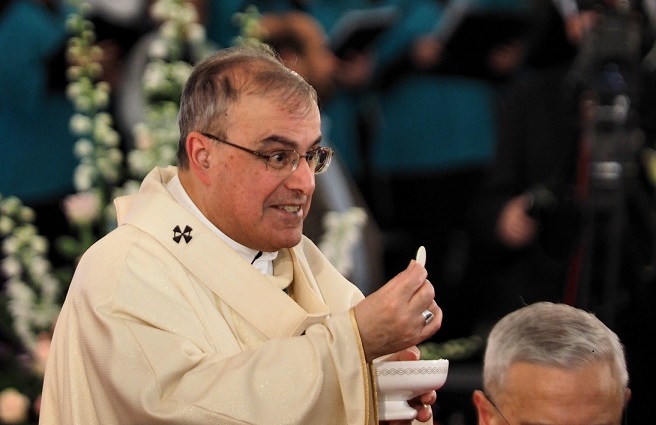Next month’s meeting in Rome, for the Extraordinary Synod on ‘Pastoral challenges for the family in the context of evangelisation’, will be a “defining moment for the whole Church”, said Archbishop Paul Cremona, Auxiliary Bishop Charles Scicluna and Gozo Bishop Mario Grech yesterday.
The Synod will be held between 5 and 19 October. The bishops also encouraged the Maltese faithful to answer Pope Francis’ call for all Christians from around the world to unite together, with one heart, in a moment of prayer on Sunday, 28 September.
The bishops said yesterday: “Above all, this meeting of the Bishops will be a profound moment of prayer. We should all pray to the Holy Spirit to enlighten the hearts of the shepherds of the Church, that the Gospel of the Family may once again be heeded as the ‘good news’ for all mankind, at a time when the family is undergoing several difficulties.
“We encourage all Maltese and Gozitan Christians to unite, as we pray fervently to God, so that as a Church, we may respond to the pastoral challenges which the family is facing in contemporary society. On 28 September and also on the days leading up to the Synod, we urge all parish communities and families to recite the Prayer to the Holy Family, which the Pope has written, as well as to offer special prayers for the meeting. Considering that October is the month of the Rosary, we encourage Christians, particularly families, to pray the rosary together.
“We pray that, through the intercession of the Holy Family of Jesus, Mary and Joseph, this Synod will serve as a moment of grace and renewal for the Church and for families around the world.”

72.5 per cent not familiar with church’s teachings on the family
The Extraordinary Synod will deal with the recent, global Church surveys, studying the pastoral challenges facing the family.
In Malta, the majority of the respondents (72.5 per cent) to the survey stated that they were not very familiar with the teachings on the family in the Bible and by the Church, while 17.4 per cent have substantial knowledge of such teachings.
In 69.7 per cent of cases, the Church’s teachings on family life are selectively accepted. The teaching that marriage is a sacrament implying fidelity, exclusivity and indissolubility is accepted but many find it difficult to follow the Church’s teachings on contraception and birth control.
Since at least 35.3 per cent of the Maltese find the concept of natural law, so common in the Church’s moral and anthropological thought, to be incomprehensible, this is a useless concept in any form of general catechesis.
However, 62.5 per cent accept that the union between a man and a woman with the aim of setting up a family is based on natural law. One fourth of respondents refrained from answering this question.
One fourth (24.9 per cent) of respondents do not agree that lapsed Catholics and declared non-believers should be allowed to celebrate a Church wedding. Those taking a more tolerant position amount in all to 44 per cent. This group varies from 22.3 per cent, who are of the opinion that the Church should accept and support these, hoping that they will return to practice their faith, to 2.5 per cent who said that the approach should not be "no" but "yes, with restrictions” (e.g. only bless the union).
Praying together as a family (62 per cent) is still common in Malta, although 20 per cent said that they rarely pray together as a family.
Participation at Mass remains a priority for Maltese and Gozitan Catholics: 65.2 per cent attend Mass on Sundays and 53.1 per cent attend frequently; others, amounting to 8.5 per cent, said that they attend Mass, “sometimes.”
These figures contrast with the results of the mass-attendance-censuses held by the Church. However, census results are always considered to be more accurate than those based on a sample.

The rosary and the visit to the Blessed Sacrament remain a very common mode of individual prayer: 49.4 per cent and 45.4 per cent respectively, while 37.7 per cent read the Bible.
The vast majority of parents (83.3 per cent) feel that it is their vocation to transmit their faith to their children and relatives: only 2.8 per cent do not feel that they have this calling. While 48.9 per cent try to transmit their faith by example, especially by living characteristic Christian values (e.g. giving charity, by reciprocal love among the couple, by praying together and going to mass together as a family); 12.3 per cent encourage their children to participate in Church activities.
Only 6.2 per cent “teach” religion to their children while 3.5 per cent challenge them to live Christ's teaching.

Do people feel that the Maltese Church is doing enough to help couples who are facing crises in their married life? Almost half (47.2 per cent) give a positive reply though 10.9 per cent think that as an institution, the Church is not doing enough.
Most respondents know of couples living together though not married. In fact, 29.9 per cent are aware of more than 6 couples living in this way, 36.7 per cent are aware of 2 to 5 couples and 9.2 per cent know of one couple. 28.7 per cent of the Maltese said that cohabitating couples feel that, while God understands them, the Church does not and 9.2 per cent think that the Church excludes them.